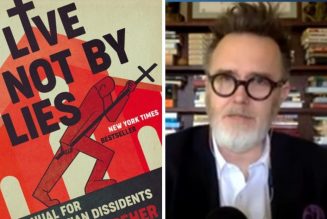By Dr. Jeff Mirus ( bio – articles – email ) | Oct 07, 2022
Leaders in today’s Church often claim that democracy is essential to human dignity and by far the best form of government. Of course, five hundred to a thousand years ago Catholic leaders tended to favor monarchy as the system that best reflects God’s rule. Clearly there is a lot of prejudice involved in these judgments, and perhaps the soundest position on this question is that the best form of government in each time and place is the form that, given the personnel available and the overall situation, can do the most good. The specific form has relatively little to do with it. Politics remains always the art of the possible.
Moreover, it troubles me that so many Catholic leaders constantly plump for democracy in the face of the steady deterioration of that form of government in the contemporary West. In our era, “democracy” is a singularly unhelpful mantra for many reasons, but perhaps the most important is the one we find built into all democratic states with large populations. As a matter of historical fact, whenever the emphasis is placed on “one person, one vote”, it creates the illusion that the individual person has somehow been empowered, and so it erroneously appears that there is no longer any need for strong intermediary institutions between the pool of isolated individuals and their government.
The problem is that one vote is all but meaningless in any political entity larger than an ancient Greek city state. The result of democracy in large countries has always been the disempowerment of the vast majority of people, because what democracy tends to produce is a large group of atomized individuals, each of whom is essentially powerless against the will of those who actually wield the power of the State. Thus, in practical human experience, democracy (defined essentially as universal suffrage) has been the most important building block of the modern bureaucratic State. (It does not help, of course, that populous, complex and increasingly technological urban societies rather naturally call for higher degrees of regulation than do their lightly-populated and technologically simpler agrarian counterparts.)
Taken all together, these reflections offer a fairly good understanding of why we are accustomed to more bureaucratic control by government today than in any previous period of history, even as we prattle endlessly on about our “individual” freedoms. The problem remains not so much the form of government as the character of those who actually wield the levers of power. But when you build massive layers of bureaucratic control in a society which has lost both its understanding of the Good and the counter-leverage of robust intermediary institutions, it is only a matter of time before the bureaucracy becomes the enemy of the people. And this is always justified in the fabled name of democracy, so much so that even Church leaders cannot stop singing its praises (that is, unless we substitute for “democracy”—which our elites love for its futility—the word “populism”—which our elites fear for its focus).
Democracy now
Sadly, democratic forms of government actually undermine the good of the citizenry as two things happen: First, the traditional levers of influence in strong intermediary institutions are stripped away on the theory that everyone is now individually enfranchised; and second, the elites in the society (for there are always elites) lose their traditional moral compass and fall increasingly into an unbridled secular hedonism. The elites, of course, always retain their material advantages regardless of the ever-changing regulations, for there is necessarily a revolving door between elite status and the reins of power.
More importantly, this pattern explains why the Western bureaucratic states today deliberately undermine the moral fiber of those they rule by forcibly imposing acceptance of and cooperation with the socially corrosive sexual libertinism which has always been the hallmark of paganism. Most affluent societies which reject the concept of one God devolve into a pattern of untrammeled individualistic lust, exhibiting even a ritual elevation of lust into something that closely resembles a public liturgy, as if to enshrine and promote the conception of a great good.
This argument about moral devolution is strongest in specifically Christian terms: All the aspects of Christianity which cause its adherents to praise God for their liberation from the power of sin become intolerable shackles when faith disappears. Having lost all sense of fulfillment and happiness in God, including even a genuine participation in the joy of redemptive suffering, people both justify and indulge their desire to immerse themselves in the pleasures of sin. Indeed, they become almost desperate for what we might call the temporary sense of psychic triumph and relief enjoyed through sin.
Moreover, because sexual attraction and the “sex drive” are typically the most powerful of the bodily and psychological urges in a physically healthy and materially comfortable person—and because these lie so close to the core of our human identity—it is precisely through sexual attractions that the unwary are most often ensnared, not only naturally but through the shrewd decision of Satan to inflame and distort these desires. Different people have different weak points, of course; for example, the desires for personal autonomy, power, wealth and social approval are also exploited, and neither gluttony nor drunkenness are in short supply. But the human sex drive is very strong, and very prone to be confused with both love and necessity. Even those who have little or no interpersonal opportunity to indulge their sexual fantasies with others are able to do so now through erotic media.
For these reasons, the sex drive lies at the root of much of our modern misery, just as its distortion is a feature—usually, again, even a ritual feature—of nearly all paganisms, whether ancient or modern. It cannot reasonably be considered surprising, then, that in the neo-decadent West, we find the abuse of human sexuality to be the weakest point in our culture, the set of evils most assiduously protected by our secular bureaucratic states, and the chief cause of the destruction of the family—and, therefore, of any healthy and cohesive social order. Given the combined power of compulsory State education and regulated mass media, it is hardly surprising that the “right” to an all-pervasive sexual/gender libertinism—in an astonishing defiance of reality—is the most common justification used today for an ever-increasing government power and control.
In other words: Bureaucratic management is the way modern cultures not only provide for but promote a general lack of awareness of, commitment to, and capacity for choosing the Good. Bureaucratic management is, to put it simply, the absolutist regime’s substitute for morality, and it makes no difference whether that regime is in some distant technical sense a democracy. Finally, bureaucratic management always becomes increasingly totalitarian, because it is the social substitute for what Christianity accomplishes through the theological virtues. It is, in other words, the State’s mimicry of the absolute power of God—and therefore the State’s diabolical mimicry of Love.
True liberty
I frequently recall the generation-old and extremely esoteric socio-political slogan, “Don’t let THEM immanentize the eschaton.” Our problem in the West today is that THEY have done exactly that—THEY being all those who have exchanged Christian responsibility for worldly satisfaction and reveled in the power of democracy to impose this exchange. Preeminent political examples are the pseudo-Catholics Joseph Biden and Nancy Pelosi, still fêted by a huge proportion even of those who claim positions of responsibility in the Catholic Church. And what are they doing? They are leveraging every power of the American bureaucracy to ensure the diabolical manipulation of human gender and the diabolical destruction of human life. Nearly forty years ago we nodded sagely over references to 1984. Now we wonder whether the bureaucratic State will have finally eliminated all coherent understanding of God by 2024—under the banner of democracy and liberty: That is, under the banner of an easily-induced mass confusion.
Again, those in the Church who continue to argue that democracy justifies everything seem not to realize that, in large populations, the mantra of “one man, one vote” is always used to strip away intermediary institutions (which can accomplish things) in favor of an atomized population in which each individual is politically isolated and therefore powerless. This is precisely our situation today, and the result is always not only government-centric but government-comprehensive. Under all similar conditions, democracy is the harbinger of bureaucratic totalitarianism. To regard it as the height of socio-political liberty is to have exchanged the commonest of sense for just another myth.
For who can deny that the modern bureaucratic State, upraised over everything in the name of individual empowerment, is currently the chief socio-political enemy of authentic liberty and genuine human progress? Our Lord promised that God will “vindicate his elect, who cry to him day and night”. But the parable indicates that they must ask…and ask…and ask with an extraordinarily persistent faith. Despite God’s intention to intervene in the end, Our Lord wondered out loud: “Nevertheless when the Son of Man comes, will He find faith on earth?”
There is no sure refuge in any particular socio-political system, especially when cowardly churchmen embrace their publicly-assigned social role and strive to be recognized as contemporary “players” by both praising and encouraging the State to do more whenever it can. The more fools, they! For it is the essential purpose of the modern bureaucratic State—the greatest tool of secularism ever developed—to assure everyone that all will be well, and very well, as long as the State is given ever more control.
Indeed, it is the very purpose of the modern bureaucratic State to ensure that the answer to Our Lord’s chilling question will be “No”. If the answer is to be “Yes”, we need stronger families, smaller political units, and robust intermediary institutions born and sustained first and foremost through a sweeping renewal of the Catholic Church. Many non-Catholics would follow. Barring a miracle on which we may not presume, our political good cannot be attained in any other way.
Note: Obviously many government employees do good work, but not counting military personnel, there is one government employee in the United States for every fifteen people, and of course a significant portion of government work is farmed out to private companies. In very broad terms, imagine how comprehensively we are “managed” in the modern bureaucratic state with a minimum ratio 1 to 15!
Sound Off! CatholicCulture.org supporters weigh in.
All comments are moderated. To lighten our editing burden, only current donors are allowed to Sound Off. If you are a current donor, log in to see the comment form; otherwise please support our work, and Sound Off!

There are no comments yet for this item.
Join Our Telegram Group : Salvation & Prosperity









